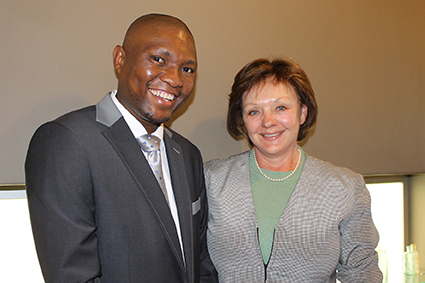
Stephen Ramabodu and Dr Marléne Campbell, Stephen’s promotor during his studies.
Photo: Leonie Bolleurs |
The university is very proud of the election of Dr Stephan Ramabodu, from the Department of Quantity Surveying and Construction Management, as Vice-President and the chairman of the fees committee of the Association of South African Quantity Surveyors (ASAQS).
ASAQS aims to advance and promote the science and practice of quantity surveying, uphold the dignity of the quantity surveying profession, and promote the high standards of professional competence and integrity, among other things. Members of the ASAQS receive guidance and resources to succeed in quantity surveying, and to stay abreast of developments in the built environment today and in the future.
The ASAQS also provides an environment in which professionals may learn, grow, and work together to advance the techniques and science of quantity surveying. The ASAQS include quantity surveying professionals from every area of the construction industry, from private practice, government and quasi-government organisations to construction companies.
Stephan completed his quantity surveying (QS) degree as well as a master’s degree in Land and Property Management at the University of the Free State. In 2014, he completed his PhD, making him the first black South African PhD holder in the Department and one of the few QS PhD holders nationwide.
In 2002, Stephen was appointed as a lecturer in the Department of Quantity Surveying and Construction Management under a programme called Grow Your Own Timber. He went to gain some commercial experience in Cape Town, where he worked for Davis Langdon. In 2008, he came back to the Free State, where he established Ramabodu & Associates Later that year, he returned to the university as a lecturer to complete all the remaining milestones of the Grow Your Own Timber programme.